Are Benadryl, Zyrtec & Claritin Safe For Dogs? – CanineJournal.com
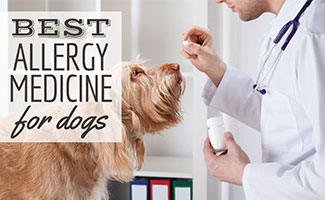 Whether your dog is suffering from digestive issues or skin problems, allergies can wreak havoc on a dog’s body. How can you relieve your dog’s suffering? You’re likely wondering, what can I give my dog for allergies? Our experts tell you all of the safe medications, supplements, and other products that can help your pup.
Whether your dog is suffering from digestive issues or skin problems, allergies can wreak havoc on a dog’s body. How can you relieve your dog’s suffering? You’re likely wondering, what can I give my dog for allergies? Our experts tell you all of the safe medications, supplements, and other products that can help your pup.
Prescription Medications
Some of the best allergy meds for dogs are available only by prescription from your veterinarian. These allergy meds are immunosuppressants, which work directly on your dog’s immune system to suppress an allergic reaction.
Nonsteriodal Immunosuppressants
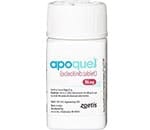
Atopica (cyclosporine) is another nonsteriodal immunosuppressant, which is most commonly prescribed for airborne allergies. Both Apoquel and Atopica are suitable for both short and long-term treatment.
Corticosteroids
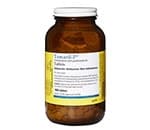
Some veterinarians use longer-acting steroid injections such as Vetalog, but side effects can be harsher with injections rather than steroid pills. Long-term side effects from steroids can include increased urinary tract infections (UTIs), susceptibility to bacterial and fungal infections, obesity, muscle weakness, and more.
What’s The Best Antihistamine For Dogs?

Benadryl (diphenhydramine) is the most popular antihistamine for humans and can be effective for dogs as well. Just be aware that Benadryl has sedative properties, so your dog could get very drowsy. Other safe antihistamines for dogs include Claritin (loratadine) and Zyrtec (cetirizine). They produce less sedation than Benadryl does but could still make your dog drowsy.
Warning: Make sure your OTC allergy medicine only contains antihistamine. Some may contain other ingredients, such as decongestants, which aren’t safe for dogs.
Dosing For Dogs
- Benadryl: 1 milligram/pound of body weight, given twice daily
- Claritin: approximately 0.1 to 0.5 milligram/pound of body weight, given once to twice daily
- Zyrtec: approximately 0.5 mg/pound of body weight, given once to twice daily
Other Over-The-Counter Allergy Relief For Dogs
If you’re wary of giving your dog pharmaceutical drugs, you’re in luck. There are a lot of safe and effective products on the market these days that can help ease your dog’s allergy symptoms. They come in several forms, from dietary supplements and food toppers to shampoo and topical sprays and balms.
Talk to your veterinarian before using these products, especially the medicated shampoos, to help relieve your dog’s allergies. You’ll want to be sure that the products will not interfere with any other medication that your dog may be taking.
Dietary Supplements
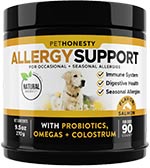
See Our Full Review Of PetHonesty
Probiotics
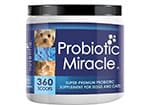
See Our Reviews Of The Best Probiotics For Dogs
Topicals

If you prefer a balm rather than spray, the Natural Dog Company has an excellent all-natural Skin Soother balm that helps treat itchy and inflamed skin, rashes, hot spots, bacterial skin infections, cuts, burns, surgical wounds, mange, and more. This organic and vegan balm contains soothing and healing ingredients like lavender, chamomile, frankincense, cocoa butter, and vitamin E.
Shampoo
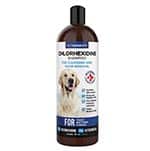
Home Remedies For Dog Allergies
Check out this three-minute video to see some cheap and easy home remedies that may help ease your dog’s allergy symptoms.
Symptoms
The signs of dog allergies typically involve skin and digestive issues. Symptoms depend on the allergen that’s causing the allergy and the severity of the reaction. But here are some signs to look out for:
- Excessive itching
- Constant licking
- Biting or gnawing at the skin
- Red, inflamed skin
- Hives or rashes
- Swelling of the face, ears, lips, eyelids, or earflap
- Diarrhea
- Vomiting
- Sneezing
- Itchy ears
- Chronic ear infections
- Itchy, runny eyes
How Do I Know What’s Causing My Dog’s Allergies?
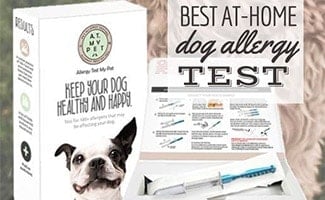
If you use an at-home allergy test, discuss the results with your vet so they can confirm the results and recommend the most appropriate allergy treatment for your dog.
Learn More About Dog Allergy Symptoms And Causes
Frequently Asked Questions About Dog Allergy Meds
Here are some of the common questions we get from our readers about dog allergy meds. Don’t see your question here? Ask us in our comment section, and we’ll try to help you out.
You should always check with your vet before administering any medication to ensure it’s safe for your dog. Each dog is different, and dosage amounts vary based on the dog’s size and needs.
Can I Give My Dog A Decongestant?
Experts warn against a decongestant for dogs. Like pseudoephedrine and phenylephrine, decongestants can be life-threatening for dogs and can cause vomiting, severe blood pressure changes, abnormal heart rates and rhythms, tremors, and seizures.
Seek veterinary care immediately if your dog accidentally ingests any kind of decongestant (they’re commonly found in human cold and flu OTC medications, particularly ones with a “-D” at the end of the name.)
Can Dogs Take Claritin?
Yes, Claritin can be safe and effective for dogs. Vets recommend that you give your dog approximately 0.1 to 0.5 milligram/pound of body weight once to twice daily. However, check with your vet before administering any medication to ensure it’s safe for your dog.
Can Dogs Take Zyrtec?
Yes, Zyrtec can be a safe and effective antihistamine for pups. Vets recommend approximately 0.5 mg per pound of body weight, given once to twice daily.
Zyrtec vs Claritin for dogs – wondering which is better? Like with humans, it depends on the individual. You can speak with your vet about trying both individually to see which seems to work better for your pup.
Pet Insurance Can Help Pay Vet Bills
Dogs can develop so many chronic problems over their lifetimes, as well as unforeseen accidents and illnesses. But if you get pet insurance early in your dog’s life (before a condition is considered pre-existing), health issues that arise in the future (like chronic allergies) could be covered for vet visits and prescription medications. See our reviews of the best pet insurance companies to learn more.
What medication or supplement has helped your dog’s allergies?




